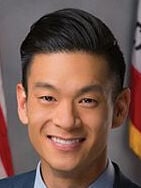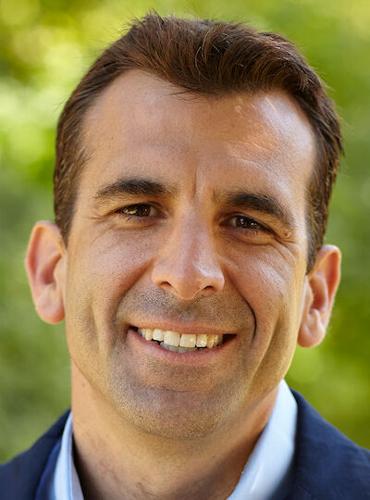Assemblymember Evan Low and former San Jose Mayor Sam Liccardo are facing one another in a turbulent race for the District 16 congressional seat to replace U.S. Rep. Anna Eshoo, D-Palo Alto.
A TUMULTUOUS RACE
A crowded, 10-person primary resulted in what was at first a historic two-way tie for the general election ballot between Low and Santa Clara Supervisor Joe Simitian, with Liccardo in a comfortable first.
Political chaos followed. An eventual recount — technically requested on Low’s behalf by former Liccardo staffer Johnathan Padilla — pronounced Low the winner by six votes, but not before he spoke out against it, citing concerns over its legality as well as its funding sources.
The recount was funded by a newly-formed Super PAC, “Count the Vote,” prompting apprehension from elected officials like Low and Eshoo that true donor sources remained unknown and a Federal Election Commission complaint alleging Liccardo masterminded the effort.
It’s an accusation he’s roundly denied, citing a San Francisco Chronicle letter to the editor from former Federal Election Commission chair Ann Ravel that the complaints were meritless and “filed by Low allies.”
“She can say it far better than I could,” Liccardo said.
Liccardo was supportive of the recount and emphasized the importance of counting every vote in an interview.
“We recognize the imperative of ensuring that every vote is accurately counted. I’m grateful that happened in this case, despite Assemblymember Low’s efforts to stop the recount,” he said. “Assemblymember Low should be grateful for that as well, because it ultimately benefited him, but we should be for it, whether it benefits us or not.”
Low is in favor of automatic recounts, he said, citing his recently-introduced legislation that would trigger anyone who requests a recount to automatically disclose major funding sources and trigger automatic recounts in extremely close races. Californians are “smart enough to connect the dots” on Liccardo’s involvement in the recount, he maintained.
“We realize funding came from out-of-state billionaires to pay for this recount in advancing the interests of Mr. Liccardo. Given that experience, I opposed the recount. It was made in my name. I did not request it. At the same time, I believe in election integrity, making sure every vote is counted,” he said.
COST OF LIVING
Locally in the 16th District and across the nation, addressing high costs of living is a touchstone issue for many residents struggling to make ends meet.
Liccardo has a host of propositions to tackle the issue, he said, including congressional financing mechanisms for investment in energy-efficient appliances and renewable energy generation for homeowners and transformation of empty office and retail structures into housing through tax credits.
Rising food prices could be addressed by creating more grocery store market competition through antitrust enforcement, he said, and high pharmaceutical prices require regulation and transparency against middlemen who draw huge profits by acting as a go-between for pharmaceutical manufacturers and care providers.
“This is a huge challenge for families, and there’s a lot of different facets of it, and so you need a different set of policies in different areas,” he said. “It’s difficult to say uniformly, ‘I know what’s going to tackle all this,’ because families are getting squeezed not in one or two directions, but in eight or nine directions.”
Low’s time in state government has helped him understand the best, most effective ways to balance a variety of funding sources — including local, state and federal sources, tax credits and infrastructure grants — to help communities produce more housing to address the growing cost of living, he said. Developing housing starts on the local level, and effectively leveraging funding actors is key.
He’s also helped pass legislation that would add more housing options at all income levels, in addition to supporting building more housing and beds for individuals with mental health and substance abuse issues, he said.
Ultimately, the issue is a deeply personal one to Low, who has been open about the fact that he, as a millennial, struggles to afford to live in the community he represents.
“It’s something I personally experience and live — that’s what I’ll bring to Congress,” he said.
BALANCING TECHNOLOGICAL DEVELOPMENT
In a district often lauded for advancing technological development and advancement, both the concerns and benefits of technological developments are felt keenly by residents and the workforce. Those concerns are also felt by Americans across the country.
Liccardo feels strongly that Congress is long overdue in passing a data privacy law, he said, legislation that’s critical to standardize regulations for businesses and give consumers control over their data and require consent for the sale or transfer of that data.
“Congress hasn’t gotten off its rear to do its job, and certainly there’s plenty to blame Big Tech for, but regulation is the responsibility of Congress. So Congress has to actually have the courage to tackle these challenges, because the cost of indecision is tremendous,” he said.
Social media platforms should also be subjected to higher industry standards and greater liability to protect children and young people on the applications while maintaining a free marketplace of ideas, Liccardo said.
Recommended for you
Representing the hub of technological development is a balancing act between innovation — which is often disruptive — and the oftentimes-slower government regulation that follows, Low said.
If elected, he would prioritize consumer protections with staying competitive in a global market and being cognizant of how technological developments impact the existing workforce. Another relevant facet of the conversation is how the federal government can restrain and assist workers whose jobs could possibly move to automation in the future, Low said, using truck drivers as an example.
“What does this do to the workforce? That’s very important for Silicon Valley and us here at home. Seeing potential displacement of jobs, replacement of workers, how do we make sure we also have opportunities from a public infrastructure standpoint … to provide retraining and reskilling of skill sets so we can transition,” he said.
Ensuring companies not only start in the area but continue to grow here is also important, along with maintaining an educational pipeline of qualified workers for those jobs, Low said.
DISTRICT-SPECIFIC ISSUES
The impact of climate change in San Mateo County cannot be understated and requires both federal funding and partnerships for the large-scale projects needed to protect residents, Liccardo said.
“As we think about San Mateo County, so much of the community is vulnerable to climate change, whether it’s homeowners who can’t get insurance against fire risk in the hillsides, or folks who are living in Pacifica facing the reality of coastal erosion, or the Bayside, grappling with sea-level rise,” he said.
He pointed to the harbor dredging project in Half Moon Bay that requires the permitting and approval of eight different agencies, effectively stagnating an extremely important project. Having a federal representative lead on building a coalition to move through the bureaucracy more quickly or advocate for federal funding could make a difference in actually completing the dredging, Liccardo said.
Low shared a similar sentiment on the impacts of climate change, also highlighting public safety issues throughout the Bay Area and positing strengthening funding and benefits for sworn peace officers that act to make communities more safe.
“At a local level and statewide and national level, we’ve seen at least the sentiment of retail theft smash-and-grabs and the community in the Bay Area not feeling safe from low-level crimes,” he said.
His experience in the state legislature will make him an effective actor in obtaining funding for those key projects, he said.
“I’m very excited to bring my experience I have at state level to federal level, understanding how much of this is intertwined,” he said.
IMMIGRATION AND BORDER SECURITY
Immigration and border security has been a key issue leading up to November’s upcoming presidential election — and it’s a topic the two Democratic candidates share some similar views on, including stabilizing pathways to citizenship for Deferred Action Childhood Arrivals while strengthening border protections.
Low said that he values public safety and would be supportive of increasing funding for border agents while creating pathways to citizenship for immigrants, including DACA recipients, and taking a comprehensive approach to immigration reform. Ultimately, the immigrant experience is an essential element of America and California’s history, he said.
“We need to reframe how we talk about immigration. … So much of the rhetoric that we’re hearing demonizes immigrants. We realize our society is built on the foundation of immigrants,” he said. “Those of farmworkers in our district and those that are part of our high-tech community. It’s a wide variety of different skill sets.”
Creating fair pathways to citizenship for DACA recipients and other immigrants, expanding visas and permanent residency for high-skilled workers and “common-sense measures” to restore border security are all policies he would support if elected, Liccardo said.
“I believe that border security should not be pitted against having a fairer immigration system. We can [have] both,” Liccardo said. “Every employer in virtually every industry will tell you that we have a serious labor shortage, and a sensible bipartisan approach would focus on an immigration policy that rewards many who want to work and contribute to the economic vitality of our country.”
ISRAEL-HAMAS WAR
Both candidates also said they’re supportive of the Biden-Harris administration’s calls for an end to the war in Gaza and a return of the hostages through negotiations.
As unrest grows in the Middle East and fears of broader regional conflict grow, such an agreement is mutually beneficial to all parties involved, Liccardo said.
“I believe it’s important for us to get this accord signed, and I believe that’s in the interest of 2 million Palestinians, and I think it’s in the interest of Israel, because Israel is facing the prospect of a war being fought on five separate fronts,” he said.
Low also highlighted the domestic implications of the Israel-Hamas war, including rising rates of antisemitism and Islamophobia, that should be addressed in tandem with foreign policy.
“I’m consistent with President Biden and Vice President Harris’ position on supporting the release of hostages, while also long lasting peace via a cease-fire,” he said. “A key focus on release of hostages and a two-state solution is the goal that is consistent with U.S. foreign policy.”


























(0) comments
Welcome to the discussion.
Log In
Keep the discussion civilized. Absolutely NO personal attacks or insults directed toward writers, nor others who make comments.
Keep it clean. Please avoid obscene, vulgar, lewd, racist or sexually-oriented language.
Don't threaten. Threats of harming another person will not be tolerated.
Be truthful. Don't knowingly lie about anyone or anything.
Be proactive. Use the 'Report' link on each comment to let us know of abusive posts.
PLEASE TURN OFF YOUR CAPS LOCK.
Anyone violating these rules will be issued a warning. After the warning, comment privileges can be revoked.